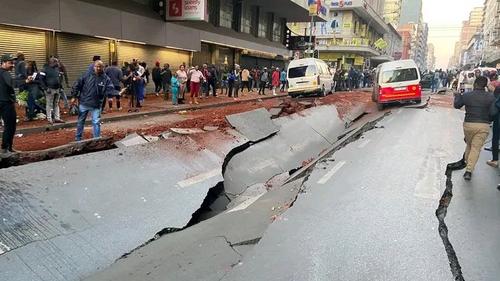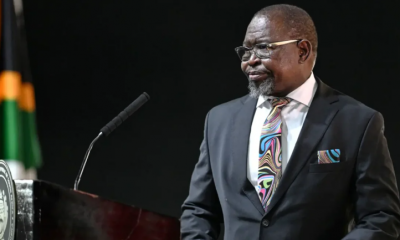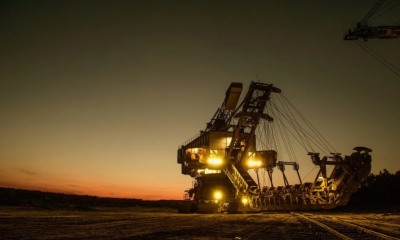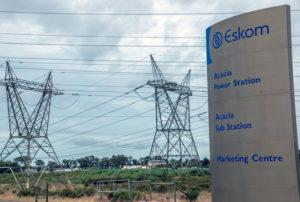411
Johannesburg’s Infrastructure Collapse: How South Africa’s Economic Hub is Falling Apart

Johannesburg, South Africa’s largest city and economic powerhouse, is in deep crisis. The roads are deteriorating, electricity supply is failing, and water shortages are becoming the norm. Years of financial mismanagement, corruption, and neglect have pushed the city to the brink of collapse.
Home to over 5.5 million people and contributing nearly 16% of South Africa’s GDP, Johannesburg should be a beacon of progress. Instead, failing infrastructure and governance issues threaten to unravel its economic and social fabric.
Experts, including Johannesburg Mayor Dada Morero and Professor Mark Swilling of Stellenbosch University, warn that the city is in financial distress. Public resources have been mismanaged, revenue collection is declining, and critical services are suffering.
A City in Financial Freefall
In January 2025, South Africa’s Auditor-General reported fruitless and wasteful expenditures exceeding R1 billion in Johannesburg. Mayor Morero admitted that the city is spending more than it earns, with a revenue collection rate dropping to 86%, resulting in a growing budget deficit.
Professor Mark Swilling highlighted corruption, particularly within Gauteng’s Department of Health, as a major contributor to Johannesburg’s financial instability. He described the department as controlled by a “syndicate” embedded within state structures, draining public funds.
Roads Falling Apart: The Pothole Capital of South Africa
Johannesburg’s road network is collapsing due to severe neglect and underfunding. The city has 902 bridges, yet only 6% are in good condition. The Johannesburg Roads Agency (JRA) reports that 78% of bridges are in poor or very poor condition, with 20 bridges on the verge of closure.
Fixing the city’s roads requires an estimated R16 billion, but financial constraints have stalled repairs. Potholes are everywhere, and some roads have deteriorated beyond recognition.
Adding to the crisis, criminal syndicates are stripping copper wiring, batteries, and solar panels from traffic lights, causing long-term failures. JRA’s acting head of mobility, Sipho Nhlapo, has called for stricter law enforcement and better public-private partnerships to address these issues.
Electricity Woes: A City Left in the Dark
Johannesburg’s electricity crisis is worsening, with City Power struggling to keep the grid operational. The utility is overwhelmed by theft, vandalism, and ageing infrastructure, leading to frequent outages.
In January 2025 alone, over 800 power outage complaints were logged in just two weeks. A maintenance backlog of R170 billion has left the city’s grid vulnerable to collapse.
Load shedding, power surges, and infrastructure failures are causing extended blackouts, forcing businesses and residents to rely on generators and solar power. Criminals are taking advantage of power cuts, stealing transformers, cables, and substation equipment, further worsening the crisis.
Adding to the city’s financial woes, Eskom reported that City Power owes it R4.9 billion in historic debt, with an additional R1.4 billion in unpaid bills.
Water Shortages: A Crisis That’s Only Getting Worse
Johannesburg’s water system is also failing. More than 60% of the city’s water network has exceeded its lifespan, leading to frequent pipe bursts and supply disruptions.
Johannesburg Water CEO Ntshavheni Mukwevho warned that the city faces a R27 billion backlog in infrastructure renewal.
Illegal connections and theft are worsening the crisis. In the past year alone, criminals have stolen:
- 1,100 water meters (R2.1 million in losses)
- 3,450 manhole covers (R3.6 million in losses)
- 3,000 valves and hydrants (R5.8 million in losses)
Load shedding has also made things worse by disrupting water pumping stations, leading to low pressure and dry taps for entire communities.
Is There a Solution?
Johannesburg’s financial leaders have proposed solutions such as:
- Improving tax collection and revenue streams
- Attracting private-sector investment for infrastructure projects
- Strengthening law enforcement to combat vandalism and corruption
However, experts warn that these efforts will not be enough unless corruption, mismanagement, and infrastructure decay are tackled head-on.
Johannesburg’s decline is not just a local issue—it threatens the economic stability of South Africa. If urgent action is not taken, the country’s most important city could face total collapse.
Follow Joburg ETC on Facebook, Twitter , TikTok and Instagram
For more News in Johannesburg, visit joburgetc.com



























